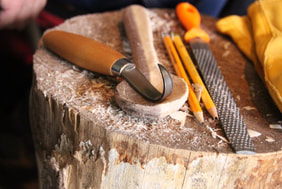woodworking
Spoon Carving One-Day Workshop
Learn the basics of spoon carving and try out your skills on kiln-dry wood. Student will develop a comfortability with several knife grasps and carving techniques using high-quality carving and crook knives. This class is suitable for both novices and those with some experience who wish to hone their carving and whittling skills. By the end of the day, you will have made a simple spoon and gained mastery of the basic skills to make spoons on your own.
All carving tools will be supplied for use. You need only to bring your imagination and a pair of carving gloves if you wish.
All carving tools will be supplied for use. You need only to bring your imagination and a pair of carving gloves if you wish.
Course Fee: $125 - Supply Fee: $15 Location: Folk School


